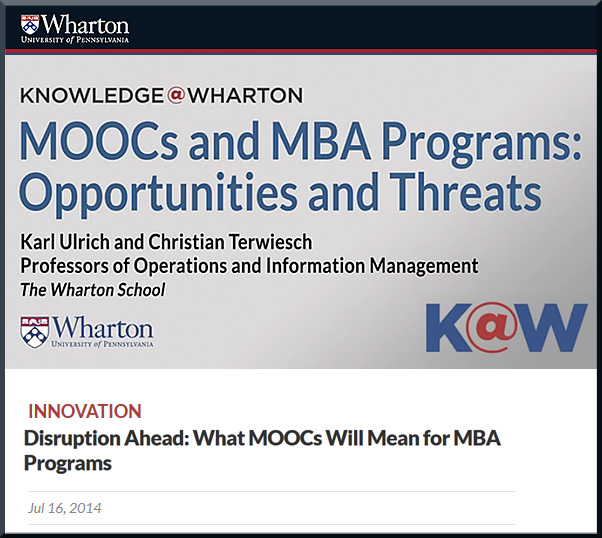From DSC:
A paraphrased excerpt:
When I watch my teenagers do their math, they use their laptops, smartphones (to text their friends), and they watch YouTube videos to explain how to do the problems.
This statement made me reflect on the vision that I’m pursuing re: the use of second screen apps in learning as it relates to Learning from the Living [Class] Room.
The video was interesting to watch, and the topic grabbed my eye — i.e., will MOOCs impact MBA programs and if so, what might the potential scenarios look like?
I appreciated the excellent example of peering into the future, developing some scenarios, and planning for those scenarios NOW.
Also see:
- Would graduate school work better if you never graduated from it? — from thechronicle.com by Steve Kolowich
Excerpt:
Learning continues long after college ends. What if being enrolled in college was also a lifelong condition?
That is how Christian Terwiesch, a professor at the University of Pennsylvania’s Wharton School, thinks graduate business programs might work in the future.
He and a colleague, Karl T. Ulrich, vice dean of innovation at Wharton, have published a paper on how the ascent of short video lectures—the kind popularized by massive open online courses and Khan Academy—might change the cost and structure of top business programs like Wharton’s. The short answer is that they probably won’t, at least not anytime soon.
…
The business school eventually might have to provide chunks of its curriculum on demand over a student’s whole career, he said, rather than during a two-year stretch at the beginning.
From DSC:
I like that question — Would graduate school work better if you never graduated from it? — as it speaks to me of tapping into the streams of content that are constantly flowing by us now…and doing so throughout our lifetimes. That’s one possible scenario for the delivery mechanism for some of our educational programs in the future.









